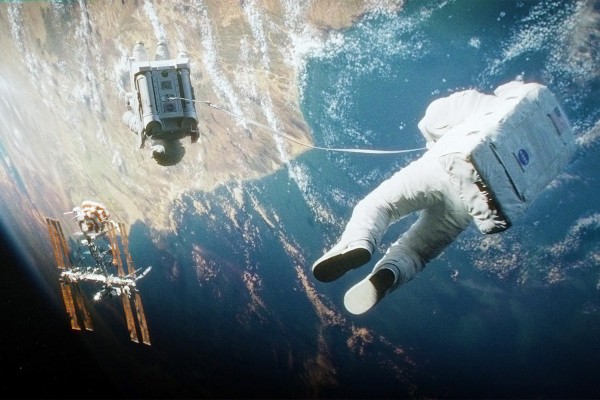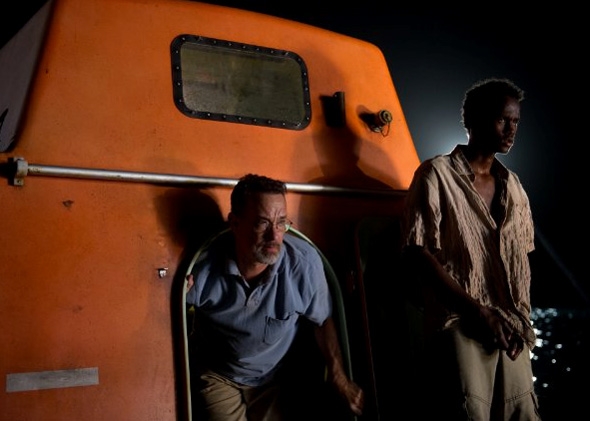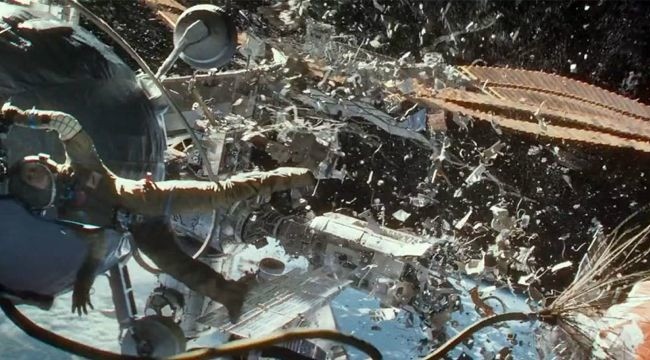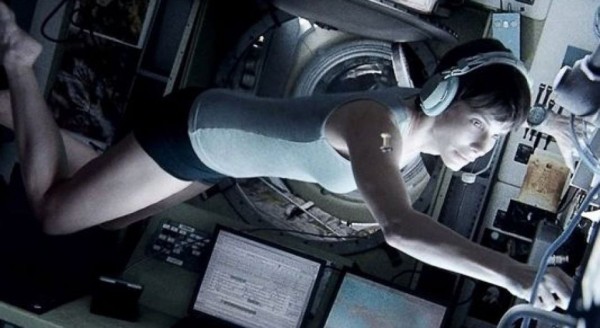[BEWARE OF SPOILERS]
Maybe it’s just a coincidence, but three movies released in the past couple of weeks – all high-profile studio films and so far box office winners and definite Oscar nominees – all seem to be about the same thing. In Paul Greengrass’s Captain Phillips, J.C. Chandon’s All Is Lost, and Alfonzo Cuarón’s Gravity, someone is cut off from the rest of the world, and takes shelter in a womb-like refuge from hostile elements that strip away all their connections to the outside world. The ordeal forces these characters to draw on their inner strength and rediscover their essence, and in doing so, they are reborn.
Are these films tapping into some current kink in the collective unconscious? Or are they just cashing in on the universal appeal of claustrophobia and motion sickness?
Motion sickness doesn’t figure much in Captain Phillips, a recreation of the real-life 2009 hijacking of a US cargo ship by Somali pirates, though a lot of time is spent bobbing about in high seas. Instead, it exploits our fear of starving, khat-addicted, zombie-like third-worlders with AK-47’s coming to kidnap us and grab their share of the bounty of the West. That’s the situation the captain of the title, a Yankee from Vermont played by Tom Hanks with an erratic accent reminiscent of the Pepperidge Farm man in the TV commercials, will find himself in. He already has a premonition that something bad is going to happen as he drives to the airport to take the flight to Dakar where he’ll assume command of his vessel, the Maersk Alabama.
Meanwhile, an ocean and a continent away in a fishing village in Somalia, a similar situation unfolds. Minions of a local warlord show up and order Muse (newcomer Barkhad Abdi, who is terrific; Best Supporting Actor nominee maybe?), a scrawny fisherman turned pirate, to get off his ass and snatch another big ship so they can demand millions in ransom. Begrudgingly (Muse probably has a bad feeling about things, too), he enlists a ragtag crew of desperately poor men (watch out for the big mean guy with the scar!) and sets out in a frail skiff to track down and land a 500 foot behemoth and its 3,000 tons of cargo, kind of like an African Ahab after a mechanized Great White Whale.
We all know how this ends, but maybe not what it means – at least according to Greengrass, whose previous films about geopolitical inequity and conflict range from Bloody Sunday (2002) to United 93 (2006),to The Bourne Identity 2004). As might be expected, his new film dutifully critiques the disparity between rich and poor that leads to such tragic confrontations. These pirates may scare the hell out of us, but aren’t they just victims themselves, the road kill of globalism whose only way of living the dream is at the expense of nice guys like Phillips? And Phillips, after all, is not all that different from them, just another working stiff who has to answer to a boss.
So we feel bad for the pirates. Nonetheless, everyone rejoices when Navy Seals show up and blow their brains out. And so I would say that as a political parable, Captain Phillips is kind of ambivalent, with two ideological impulses cancelling each other out.
Instead of being political, then, Captain Phillips, like All Is Lost and Gravity, is existential. All three films tap into the state of mind of felt by people faced with the prospect of catastrophic loss brought about by causes beyond their control. Confronted by this fear, they recover their true selves. But this occurs only after an ordeal that has stripped them of everything that has defined their lives, uncovering the indomitable spirit beneath.
For Captain Phillips, that means he first loses his authority, as Muse climbs on board with his three followers and declares, “I am the Captain.” No longer in command (and it is clear from their interactions before the hijacking that Phillips wasn’t exactly a crew favorite) the deposed Captain must draw on those basic, traditionally masculine virtues of rationality, sang-froid, and self-sacrifice. In short, he becomes the Tom Hanks we all know and love from such roles as Captain Miller in Saving Private Ryan (1998). Vulnerable, decent, level-headed, and when it matters most, utterly courageous.
But is it enough? After he loses his ship, he then loses his freedom, and may well lose his life. The pirates drag him from into a lifeboat – an enclosed, womb-like vessel
– and head out to sea. As the situation deteriorates and the pirates get desperate (we warned you about the guy with the scar!) Phillips jots down a farewell note to his family, cutting off the last tie that binds him to the world beyond. But having reached that extremity, he is pulled from the lifeboat covered with blood, courtesy of the miraculous intercession of SEAL Team Six.
Meanwhile, things are not looking so rosy in All Is Lost. “All is lost,” Robert Redford intones at the very beginning of the film, reciting in voiceover a farewell letter he has written, put in a bottle, and thrown into the ocean. Like Captain Phillips when he scribbled a similar note, Redford’s character (referred to in the press notes as “Our Man” – a variation on Everyman?) has reached the end. The film then flashes back to the beginning and retraces the events that led to this situation.
Like Captain Phillips,” All Is Lost also involves cargo ships, except in this case the hero is not on board with these symbols of mass consumption and international capitalism, but is their victim. One of these behemoths has apparently lost a container en-route, and the bus-sized metal box has drifted into Our Man’s yacht, the Virginia Jean, rupturing the hull. A prolonged battle for survival reminiscent of Jack London’s “To Build a Fire” follows, as Our Man resourcefully struggles to overcome every new ordeal (rendered in fascinating detail; you keep wondering what life-saving tool the guy will come up with next).
But with each new crisis he also loses more of his possessions – both material items and personal belongings – that preserve his identity and link him with the human world. And as with Phillips, this attrition reduces Our Man to his core being – a beleaguered soul determined to survive.
His initial patching of the hull succeeds at first, but subsequent storms undo his work, forcing Our Man to abandon ship and take refuge in an inflatable life raft – a vessel much like the one in Captain Phillips.
He navigates the tiny craft into the shipping lanes, where, like Muse and his tiny skiff, he tries to waylay passing container ships, the cause of all his problems in the first place. But lacking an attention getting device such as an AK-47 (a flare gun has no effect), he is ignored by the towering hulks, which seem devoid of any human presence. By the end he has lost everything, and sinks into the sea, until he too is rescued by a near miraculous intervention, even if it is only imaginary.
Which brings us to Gravity, number one at the box office for the second week in a row and, perhaps not coincidentally, the least political film in the group (though a stickler might complain about its compliance with gender stereotypes). Once again, our hero gets cut off from the rest of the world, but instead of pirates or cargo ships being to blame, it’s those darn Russians who, for whatever nefarious warmongering reasons, have blown up an old military satellite, setting off a chain reaction of blasted orbiters. The debris storm rips by at mindboggling speed and in utter silence into the path of astronauts Stone (Sandra Bullock) and Kowalski (George Clooney), who are tending to an ailing Hubble telescope. The lethal space junk shreds the shuttle, not to mention their fellow astronauts, and sends Stone adrift, her umbilical cord to the mother ship severed.
And so Stone goes through the now familiar drill of losing touch with all that connects her to her old life (not just Kowalski and Houston but also her grief for a dead child — a perfunctory, button-pushing attempt to establish a backstory) and in so doing discovers her inner resources – the resilient, resourceful, independent identity she didn’t know she had. Well, not entirely independent, as Kowalski
– here the disembodied male superego that grounds Stone’s flighty femaleness – walks her through the various procedures via radio contact. Again, the protagonist is ensconced in a vessel and even assumes a fetal position to make sure everyone gets the point.
And after a stunning last minute reprieve from certain death (ah, the miracle of oxygen deprivation), Stone, too is reborn, and like Phillips and Our Man, emerges from the sea of troubles renewed.
So, once again audiences are taken to the brink, they learn to “let it go” (the phrase repeated in Gravity), learn that “everything is going to be all right,” (the somewhat ironic refrain in Captain Phillips) even though, as in All Is Lost, it looks like all is lost.
And what does this mean? Are people flocking to these films because they are scared, feel cut off from and ignored by those who are controlling their lives, and are looking for either their own resources or some deus ex machina to save them?
Probably. Also, they are really good movies.
Just a couple of closing notes on the many films that Gravity resembles. Two in particular, both of which explore similar themes with darker conclusions: 2001, though with Bullock as the space baby and Clooney as the monolith; and Alien with Bullock as Ripley (there is a scene with Stone in her skivvies manning a spacecraft that must be an allusion)
and Clooney as the alien, but a benevolent one.
And, a final caveat: if someone says they are going to “talk with the elders,” don’t believe them.









